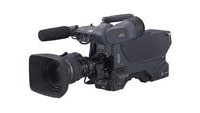Sports productions acquire 1080p cameras
The professional video industry's #1 source for news, trends and product and tech information. Sign up below.
You are now subscribed
Your newsletter sign-up was successful

Sports producers have always pushed the envelope when it comes to experimenting with and fully embracing new technology to make a production more compelling. It’s been that way with HDTV and continues today with the latest generation HD cameras.
Mobile production companies, which produce an increasing variety of live sports broadcasts for national audiences, have begun to purchase HD camera capable of acquiring in a higher resolution for HD, 1080p60, even though most consumers with HD sets at home can’t see it. For these live production companies, the idea is to use these new cameras to attract business from sports producers looking for the highest quality production possible.
In the past six months, a number of truck suppliers have placed major orders for 1080p HD cameras, which also support fiber or triax, and quickly convert from portable to hard camera configuration. They’re buying cameras that can capture in multiple formats, which have now become available from Grass Valley and Sony, in an effort to future-proof their investments.
Buying these cameras now enables a user to televise an event today in 1080i or 720p resolutions, yet be ready when sports producers start asking for higher quality. Many agree that it will happen within the next three years, as consumers install 1080p-capable sets in their homes. To date, only a few 1080p sets have been sold, compared to 1080i LCD and 720p plasma TVs.
For example, Pittsburgh-based NEP Broadcasting said it would deploy 150 Sony HDC-1500 (handheld) and HDC-1000 (fixed) HD cameras across its operations during the next two years. The multiformat HD cameras — which accommodate the 1080/60p, 50p, 60i, 50i and 24p, as well as 720/60P and 50P HD formats — will be used in the company’s mobile production vehicles for live sports and entertainment, as well as for large-screen video reinforcement through NEP’s Screenworks division.
Because it works with a variety of clients that request specific equipment, NEP has also purchased numerous Grass Valley LDK 8000 HD cameras, which are also capable of capturing live sports images in 1080p 60. Colorado Studios (based in Denver) and Token Creek Mobile Television (Based in Madison, WI) have also ordered the LDK 8000.
To complement the new HD cameras, these same production companies are now considering 3Gb/s routers to handle the increased bandwidth that multiple 1080p60 cameras on a single production might require. Companies such as Grass Valley, Harris, NVISION, Pesa, Pro-Bel and Utah-Scientific all offer the capability, and other production companies are now considering it. At present, most use a 1.5Gb/s infrastructure, which all say is more than adequate for current live sports production.
The professional video industry's #1 source for news, trends and product and tech information. Sign up below.
Chuck Meyer, NVISION’s president, said 3Gb/s signals could travel farther than 1.5Gb/s, making events like golf easier to handle, with fewer (and more handheld) cameras.
George Hoover, NEP’s senior VP of engineering, said a mobile production company’s assets have to work for as many clients as many days as possible. This concept has changed little in the past few years. Like any technology they implement, buying a 1080p camera now makes good business sense.
